外研版高中英语Book5 Module1 British and American English Period4 Listening课件(共35张PPT)
文档属性
| 名称 | 外研版高中英语Book5 Module1 British and American English Period4 Listening课件(共35张PPT) | 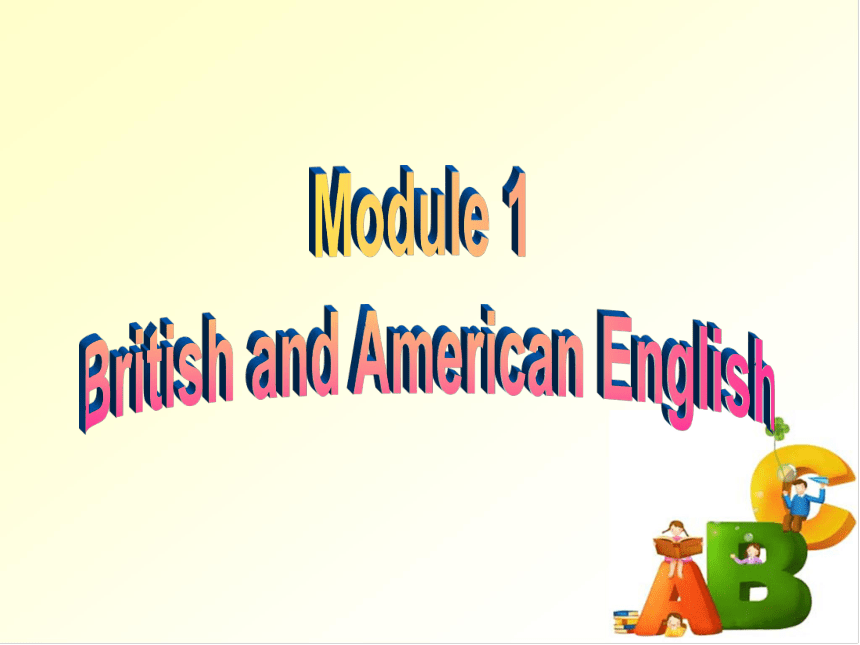 | |
| 格式 | zip | ||
| 文件大小 | 1.4MB | ||
| 资源类型 | 教案 | ||
| 版本资源 | 外研版 | ||
| 科目 | 英语 | ||
| 更新时间 | 2018-12-03 18:56:54 | ||
图片预览

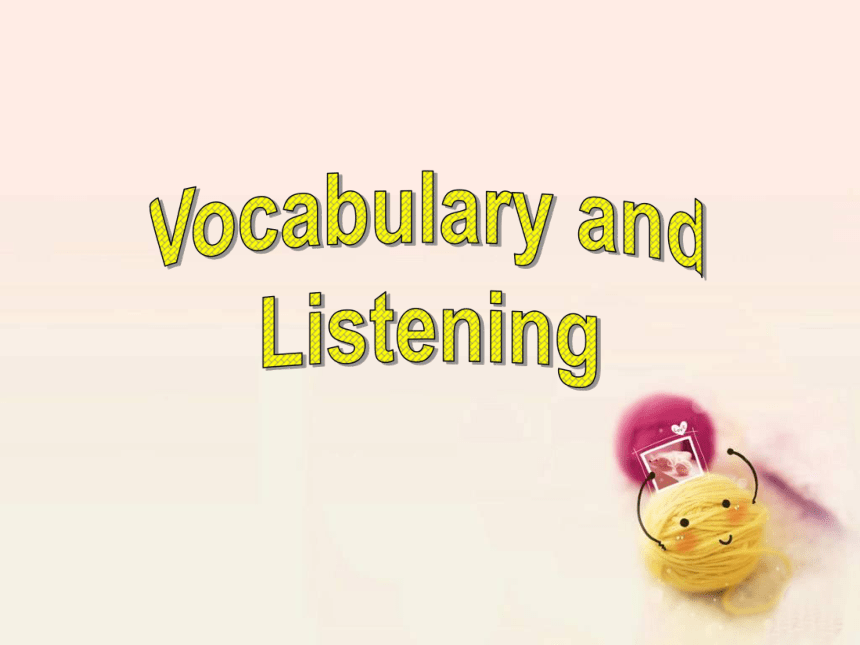


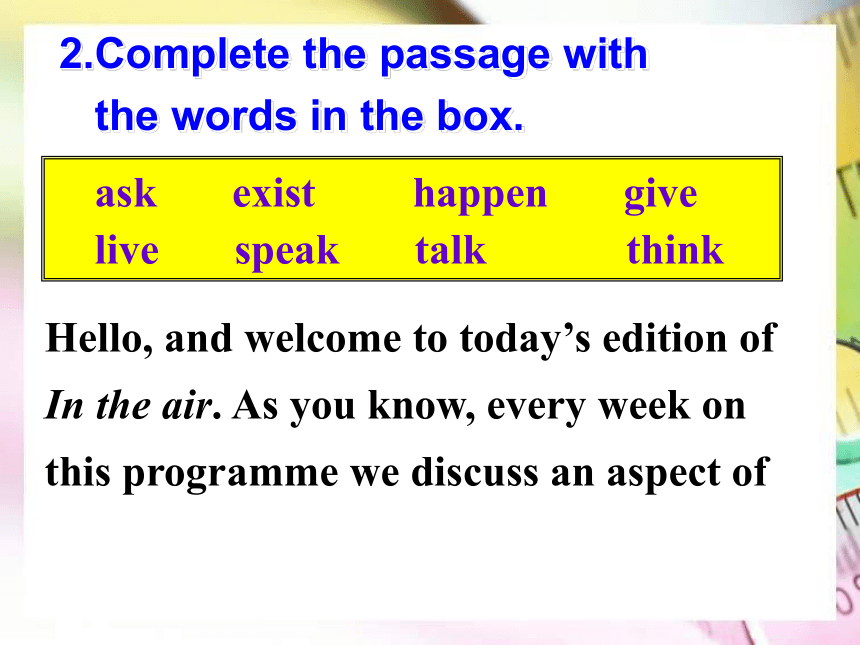

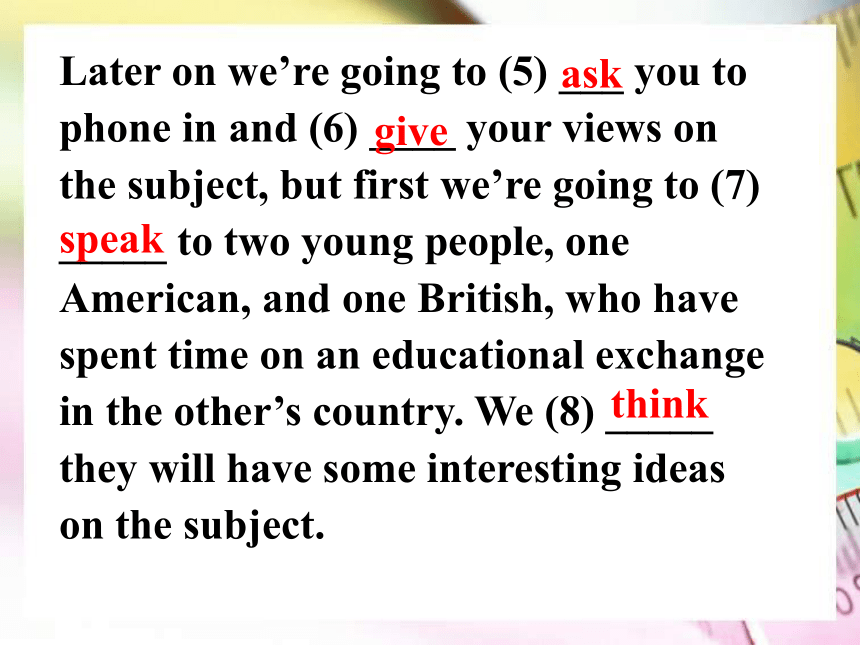
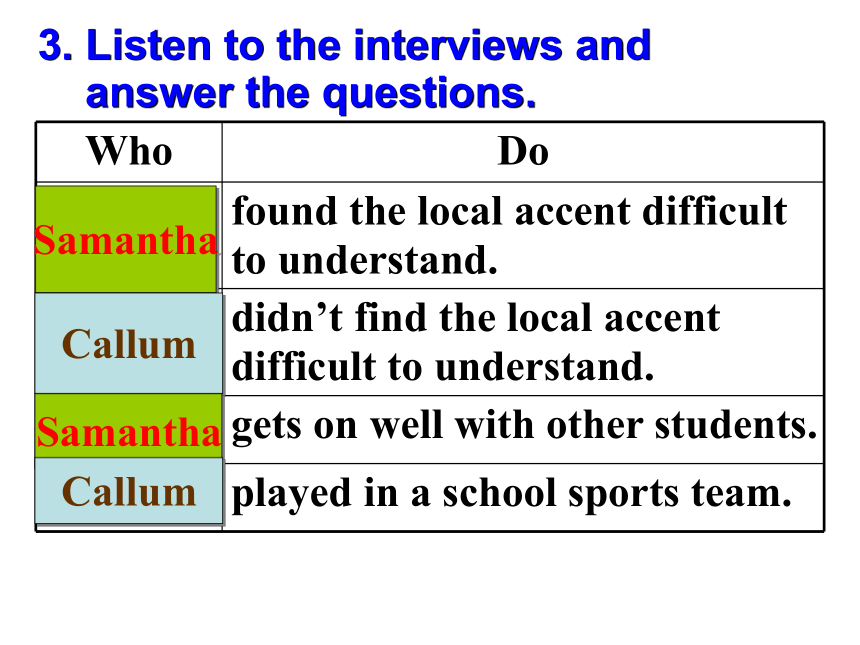
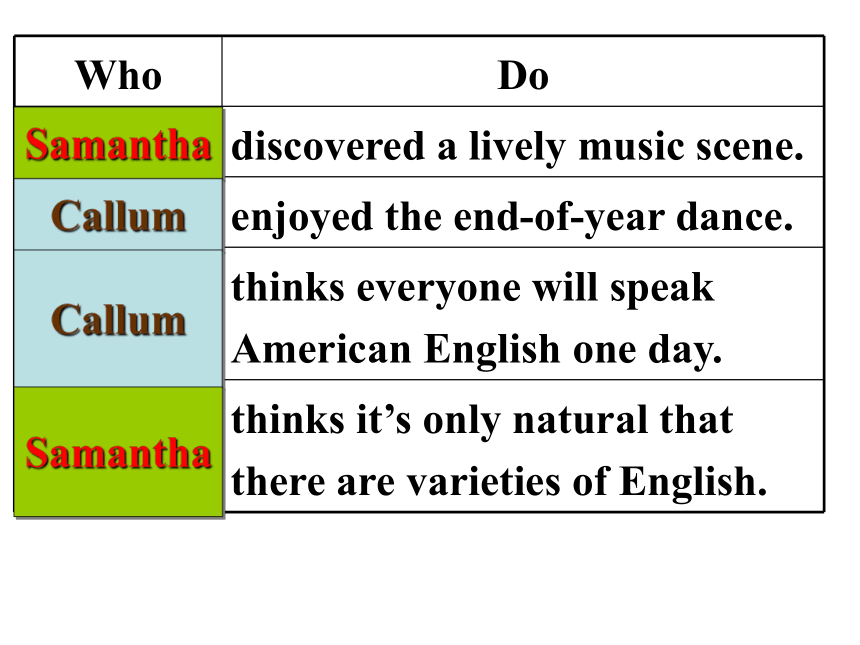
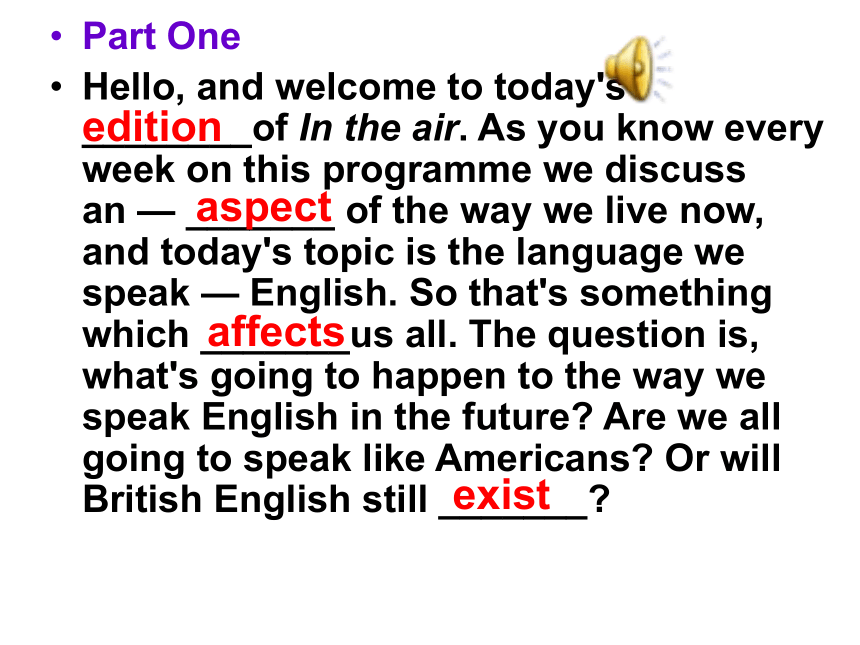

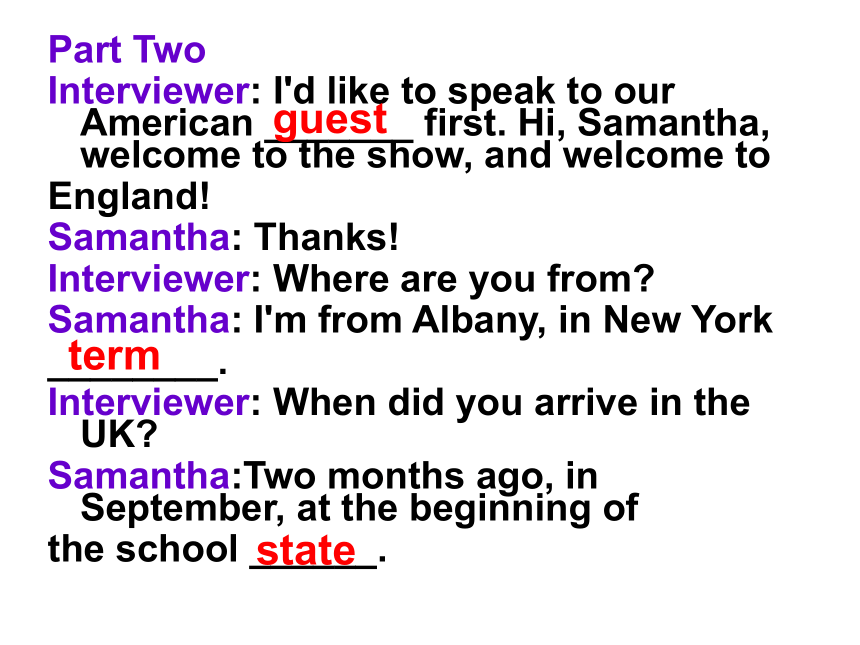
文档简介
课件35张PPT。Module 1
British and American EnglishVocabulary and
Listeningexchange students1. Think about problems exchange students have. Number them in order of importance.1
2
4
3
5
6a. understanding the language
b. getting on with people
c. food
d. different school subject and timetable
e. local customs
f. climate2.Complete the passage with
the words in the box.Hello, and welcome to today’s edition of In the air. As you know, every week on this programme we discuss an aspect of ask exist happen give
live speak talk thinkthe way we (1) ___ now, and today’s topic is the language we (2) _____ ---English. So that’s something which affects us all. The question is, what’s going to(3) ______ to the way we speak English in the future? Are we all going to speak like Americans? Or will British English continue to (4) ____? livespeakhappenexistLater on we’re going to (5) ___ you to phone in and (6) ____ your views on the subject, but first we’re going to (7) _____ to two young people, one American, and one British, who have spent time on an educational exchange in the other’s country. We (8) _____ they will have some interesting ideas on the subject. askgivespeakthinkSamanthaCallumSamanthaCallum3. Listen to the interviews and
answer the questions.SamanthaCallumCallumSamanthaPart One
Hello, and welcome to today's ________of In the air. As you know every week on this programme we discuss an — _______ of the way we live now, and today's topic is the language we speak — English. So that's something which _______us all. The question is, what's going to happen to the way we speak English in the future? Are we all going to speak like Americans? Or will British English still _______? editionaspectaffectsexist Later on we're going to ask you to phone in and give your views on the subject, but first we're going to speak to two young people, one American, and one British, who have spent time on an educational __________in the other's country because we thought perhaps they would have some interesting ideas on the _________.exchangesubjectPart Two
Interviewer: I'd like to speak to our American _______ first. Hi, Samantha, welcome to the show, and welcome to
England!
Samantha: Thanks!
Interviewer: Where are you from?
Samantha: I'm from Albany, in New York
________.
Interviewer: When did you arrive in the UK?
Samantha:Two months ago, in September, at the beginning of
the school ______.
gueststatetermInterviewer: How did you get to hear about the exchange?
Samantha:I saw an _____________ in my school magazine back in the states.
Interviewer: Where are you attending school now?
Samantha:In Leeds, in Yorkshire.
Interviewer:And how are you getting on?
Samantha:I'm getting on just fine, now that I understand the local accent.advertisementInterviewer:So, it was difficult at first?
Samantha:Yes, because I didn't get what people were saying for a couple of days. I think that was the biggest problem I had when I arrived.
Interviewer:But then you got used to it?
Samantha:Yes — and now it seems quite normal. In fact, in some ways the _______ here, in the north of England, reminds me of American English.
Interviewer:How do you mean?
accentSamantha:Well, like they say bath instead of bath, or Do you want to dance instead of dance, like they do in other parts of Britain.
Interviewer:What's been the most _________
thing about the exchange so far?
Samantha:Definitely the people, especially the other students in my class. They're really friendly.
Interviewer:Is there anything else you like about living in Britain?positiveSamantha:Lots of things, like the music scene in Leeds, for instance. I like Leeds because there's more going on here than back home in the states. The school has a _________music laboratory, which is really interesting.
Interviewer:I've got a question to ask you, Samantha, about the future of English. Do you think in the future everyone will speak American English?
creative
Samantha:No, why should they? Since English is spoken all over the world, I guess it's only natural that there are lots of _________.
Interviewer: So do you think you'll go home speaking with a north of England accent?
Samantha:Oh no, I didn't mean that!varietiesPart Three
Interviewer:Well now I'd like to turn to our other guest, another exchange student, that's eighteen-year-old Callum Nightingale. Callum, you _________ returned from the US. How long were you there?
Callum: Ten months altogether.
Interviewer:And where were you?
Callum:I was in a fertile _____________ region, in a fairly small town in Mississippi.
Interviewer:That's quite a long way south, isn't it?
recentlyagriculturalCallum: Yes, it is.
Interviewer: What was the most difficult problem you had?
Callum: I reckon it was the climate; it was hot and humid for a lot of the time.
Interviewer: How did you ____ ___ with American English?
Callum: Well, I didn't really have any problems with the accent. It was easy to understand, they speak rather slowly.getonInterviewer:But did they understand you?
Callum:That's a good _______. I think they did. As I was the only British person in the school they made a fuss of me. The girls all said my accent was cute.
Interviewer:What was the best moment of your stay?
Callum:I think it was the prom, that's the school dance at the end of the year.
Interviewer:I want to ask you a couple of questions about American English. Did you find that a lot of words are different?
point Callum:Yes, especially at school — they have ________, we have years, then the names of subjects are a bit different, like "civics", which basically means law and _____________. And some sports are different — football means American football, not soccer — I actually played in the ________ team. Then the American word for maths is math, without the "s" — that seems like a very small detail. But the first time I heard it, it sounded strange ... but you get used to it. When I came home my mum said I had picked up an American accent, but it's worn off now I think.gradesgovernmentsoccerInterviewer:Callum, do you think that in the future everybody will speak an American variety of English?
Callum:Maybe yes. I think the British will speak American English because they hear it every day now, on TV, in films and so on.
Interviewer:And are you happy about that?
Callum:I don't know. I ___________ I don't mind, really. Everything changes sooner or later.supposeSome useful expressions in the listening: 例如
富饶的
农业地区
3. 所言极是。
4. 对…过分关心
for instancefertile agricultural
region
That’s a good point.make a fuss of5.毕业舞会
6.学会美式口音
7.褪去,消褪
8.讲美式英语
9.事情迟早都会
发生变化的。
prompick up an
American accentbe worn offspeak an American
variety of EnglishEverything changes
sooner or later.Complete the sentences with the correct phrases.1. How are you getting on? is a question about___. A. Samantha’s health B. what Samantha is doingEveryday English 2. I didn’t get what people were saying means____. A. I didn’t understand it B. I didn’t like it
3. When Samantha got used to the accent she____. A. began to understand it B. used it when she spoke
English4. So far means _____. A. for a long time B. until now
5. That’s a good point means____. A. what you say is interesting B. I agree with you
6. The girls in Callum’s school made a fuss of him by__. A. laughing at him B. showing a lot of interest in him7. A cute accent is ____.
A. horrible B. attractive
8. A couple of means ____. A. two B. two or three
9. If Callum picked up the local accent he ____. A. started to use it B. wasn’t able to use it10. If Callum’s American accent has worn off, it has___.
A. disappeared B. become very noticeable1. point
1) 要点; 中心思想
e.g. He missed the whole point of my speech.
他没弄明白我整个演说的要点。
2) 意义;目的;用途un. (+in/of)
e.g. There is no point in complaining.
抱怨没有任何意义。Language points2. wear
1) wear off 慢慢消失
e.g. The pain in his back is wearing off.
他背部的疼痛正在慢慢消失。
2) wear out 使疲惫不堪
e.g. He was worn out by the hard work.
繁重的工作使他疲惫不堪。3. pick up
举起或抬起某人[某物]; 拿起; 拾起:
e.g. He picked up the book from the floor.
他从地板上把书拾起来.
(b) 见到, 听到(尤指藉助仪器):
e.g. The equipment picked up the signal
from the satellite.
这设备收到了卫星发出的信号。(c) 通过实践学会(外语、 技术等):
e.g. She soon picked up French when she went to live in France.
她到法国居住后很快就学会了法语。
(d) 得, 染(疾病):
e.g. pick up an infection, a cold, the flu, Finish the exercises in the workbook.HomeworkThank you!
British and American EnglishVocabulary and
Listeningexchange students1. Think about problems exchange students have. Number them in order of importance.1
2
4
3
5
6a. understanding the language
b. getting on with people
c. food
d. different school subject and timetable
e. local customs
f. climate2.Complete the passage with
the words in the box.Hello, and welcome to today’s edition of In the air. As you know, every week on this programme we discuss an aspect of ask exist happen give
live speak talk thinkthe way we (1) ___ now, and today’s topic is the language we (2) _____ ---English. So that’s something which affects us all. The question is, what’s going to(3) ______ to the way we speak English in the future? Are we all going to speak like Americans? Or will British English continue to (4) ____? livespeakhappenexistLater on we’re going to (5) ___ you to phone in and (6) ____ your views on the subject, but first we’re going to (7) _____ to two young people, one American, and one British, who have spent time on an educational exchange in the other’s country. We (8) _____ they will have some interesting ideas on the subject. askgivespeakthinkSamanthaCallumSamanthaCallum3. Listen to the interviews and
answer the questions.SamanthaCallumCallumSamanthaPart One
Hello, and welcome to today's ________of In the air. As you know every week on this programme we discuss an — _______ of the way we live now, and today's topic is the language we speak — English. So that's something which _______us all. The question is, what's going to happen to the way we speak English in the future? Are we all going to speak like Americans? Or will British English still _______? editionaspectaffectsexist Later on we're going to ask you to phone in and give your views on the subject, but first we're going to speak to two young people, one American, and one British, who have spent time on an educational __________in the other's country because we thought perhaps they would have some interesting ideas on the _________.exchangesubjectPart Two
Interviewer: I'd like to speak to our American _______ first. Hi, Samantha, welcome to the show, and welcome to
England!
Samantha: Thanks!
Interviewer: Where are you from?
Samantha: I'm from Albany, in New York
________.
Interviewer: When did you arrive in the UK?
Samantha:Two months ago, in September, at the beginning of
the school ______.
gueststatetermInterviewer: How did you get to hear about the exchange?
Samantha:I saw an _____________ in my school magazine back in the states.
Interviewer: Where are you attending school now?
Samantha:In Leeds, in Yorkshire.
Interviewer:And how are you getting on?
Samantha:I'm getting on just fine, now that I understand the local accent.advertisementInterviewer:So, it was difficult at first?
Samantha:Yes, because I didn't get what people were saying for a couple of days. I think that was the biggest problem I had when I arrived.
Interviewer:But then you got used to it?
Samantha:Yes — and now it seems quite normal. In fact, in some ways the _______ here, in the north of England, reminds me of American English.
Interviewer:How do you mean?
accentSamantha:Well, like they say bath instead of bath, or Do you want to dance instead of dance, like they do in other parts of Britain.
Interviewer:What's been the most _________
thing about the exchange so far?
Samantha:Definitely the people, especially the other students in my class. They're really friendly.
Interviewer:Is there anything else you like about living in Britain?positiveSamantha:Lots of things, like the music scene in Leeds, for instance. I like Leeds because there's more going on here than back home in the states. The school has a _________music laboratory, which is really interesting.
Interviewer:I've got a question to ask you, Samantha, about the future of English. Do you think in the future everyone will speak American English?
creative
Samantha:No, why should they? Since English is spoken all over the world, I guess it's only natural that there are lots of _________.
Interviewer: So do you think you'll go home speaking with a north of England accent?
Samantha:Oh no, I didn't mean that!varietiesPart Three
Interviewer:Well now I'd like to turn to our other guest, another exchange student, that's eighteen-year-old Callum Nightingale. Callum, you _________ returned from the US. How long were you there?
Callum: Ten months altogether.
Interviewer:And where were you?
Callum:I was in a fertile _____________ region, in a fairly small town in Mississippi.
Interviewer:That's quite a long way south, isn't it?
recentlyagriculturalCallum: Yes, it is.
Interviewer: What was the most difficult problem you had?
Callum: I reckon it was the climate; it was hot and humid for a lot of the time.
Interviewer: How did you ____ ___ with American English?
Callum: Well, I didn't really have any problems with the accent. It was easy to understand, they speak rather slowly.getonInterviewer:But did they understand you?
Callum:That's a good _______. I think they did. As I was the only British person in the school they made a fuss of me. The girls all said my accent was cute.
Interviewer:What was the best moment of your stay?
Callum:I think it was the prom, that's the school dance at the end of the year.
Interviewer:I want to ask you a couple of questions about American English. Did you find that a lot of words are different?
point Callum:Yes, especially at school — they have ________, we have years, then the names of subjects are a bit different, like "civics", which basically means law and _____________. And some sports are different — football means American football, not soccer — I actually played in the ________ team. Then the American word for maths is math, without the "s" — that seems like a very small detail. But the first time I heard it, it sounded strange ... but you get used to it. When I came home my mum said I had picked up an American accent, but it's worn off now I think.gradesgovernmentsoccerInterviewer:Callum, do you think that in the future everybody will speak an American variety of English?
Callum:Maybe yes. I think the British will speak American English because they hear it every day now, on TV, in films and so on.
Interviewer:And are you happy about that?
Callum:I don't know. I ___________ I don't mind, really. Everything changes sooner or later.supposeSome useful expressions in the listening: 例如
富饶的
农业地区
3. 所言极是。
4. 对…过分关心
for instancefertile agricultural
region
That’s a good point.make a fuss of5.毕业舞会
6.学会美式口音
7.褪去,消褪
8.讲美式英语
9.事情迟早都会
发生变化的。
prompick up an
American accentbe worn offspeak an American
variety of EnglishEverything changes
sooner or later.Complete the sentences with the correct phrases.1. How are you getting on? is a question about___. A. Samantha’s health B. what Samantha is doingEveryday English 2. I didn’t get what people were saying means____. A. I didn’t understand it B. I didn’t like it
3. When Samantha got used to the accent she____. A. began to understand it B. used it when she spoke
English4. So far means _____. A. for a long time B. until now
5. That’s a good point means____. A. what you say is interesting B. I agree with you
6. The girls in Callum’s school made a fuss of him by__. A. laughing at him B. showing a lot of interest in him7. A cute accent is ____.
A. horrible B. attractive
8. A couple of means ____. A. two B. two or three
9. If Callum picked up the local accent he ____. A. started to use it B. wasn’t able to use it10. If Callum’s American accent has worn off, it has___.
A. disappeared B. become very noticeable1. point
1) 要点; 中心思想
e.g. He missed the whole point of my speech.
他没弄明白我整个演说的要点。
2) 意义;目的;用途un. (+in/of)
e.g. There is no point in complaining.
抱怨没有任何意义。Language points2. wear
1) wear off 慢慢消失
e.g. The pain in his back is wearing off.
他背部的疼痛正在慢慢消失。
2) wear out 使疲惫不堪
e.g. He was worn out by the hard work.
繁重的工作使他疲惫不堪。3. pick up
举起或抬起某人[某物]; 拿起; 拾起:
e.g. He picked up the book from the floor.
他从地板上把书拾起来.
(b) 见到, 听到(尤指藉助仪器):
e.g. The equipment picked up the signal
from the satellite.
这设备收到了卫星发出的信号。(c) 通过实践学会(外语、 技术等):
e.g. She soon picked up French when she went to live in France.
她到法国居住后很快就学会了法语。
(d) 得, 染(疾病):
e.g. pick up an infection, a cold, the flu, Finish the exercises in the workbook.HomeworkThank you!
